

|
|
Study, work or travel in the UK. British
culture and life.
|
|
||
|
|
|
|
||
 |
||||
|
|
|
|
||
 |
||||
|
British meals
|
||||
|
Sections:
|
Introduction |
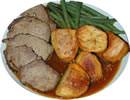 |
| British meals | ||
| Common ideas | ||
| Links | ||
|
Related pages:
|
Pubs (a guide to British pubs and drinks) | |
| Products (types of British food) |
 |
Great
British Food Author: Heather Hay Ffrench Publisher: Quiller Press Ltd Date: March 2000 |
 |
Rick
Stein's Food Heroes Author: Rick Stein Publisher: BBC Consumer Publishing (Books) Date: September 2002 |
 |
"Time
Out" London Eating and Drinking Guide 2005 |
 |
Vegetarian
Britain and Ireland Editors: Alex Bourke, Katrina Holland Publisher: Vegetarian Guides Ltd Date: April 2002 |
The first meal of the day in the morning is breakfast (usually eaten between about 7:30 and 9:00). Many British people eat toast with butter or margarine and jam (often strawberry, raspberry, apricot or blackcurrant jam), marmalade (a type of jam made from oranges) or Marmite (a dark brown spread made from yeast). Melon, grapefruit or fruit cocktail are popular. Others eat a bowl of cereal; for example, cornflakes or muesli with milk, or porridge (a mixture of oats, hot milk and sugar). A traditional English breakfast (also known as a cooked breakfast or a fry-up) is a cooked meal which may contain food such as sausages, bacon, kippers (herring - a type of fish - which has been covered in salt and smoked), black pudding, scrambled or fried or poached egg (for details about how to cook a poached egg, see: http://www.perfectpoachedegg.com), mushrooms, fried tomatoes, baked beans, hash browns and toast. People sometimes eat a boiled egg, dipping (dunking) strips of toast (soldiers) into the egg yolk. A continental breakfast is a small meal and is not cooked; for example, a bread roll or croissant with cheese or ham and a cup of coffee. The most common drinks at this time of day are orange juice or a cup of breakfast tea.
Many people have a tea-break at about 11:00 in the morning (elevenses). If a meal is eaten in the late morning instead of both breakfast and lunch, it is called brunch.
Lunch (sometimes called more formally luncheon)
is the meal eaten in the middle of the day (usually between about 12:30 and
2:00). Many people eat a sandwich (also known as a butty or sarnie
in some parts of the UK). Some people have a simple meal such as cheese and
biscuits or soup and bread. A ploughman's lunch is a traditional
lunch for farmers: a bread roll, Cheddar cheese, Branston pickle
and salad, perhaps with a pork pie. It is also traditional for
people to go to a pub with some friends for a pub lunch and a drink.
A Sunday roast is a traditional meal eaten by a family at Sunday lunchtime;
for example, roast beef with roast potatoes, parsnips,
peas, Brussels sprouts, green beans, Yorkshire pudding,
bread sauce and gravy. Mint sauce or redcurrant jelly
is often eaten with lamb, apple sauce with pork, and horseradish
sauce (a type of mustard) with beef, cranberry sauce with
turkey. Stuffing may be eaten with chicken or turkey.
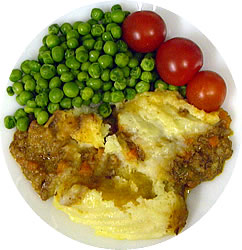 |
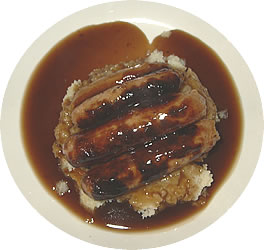 |
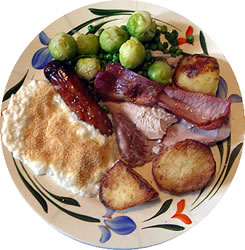 |
|
Shepherd's pie,
peas and tomatoes |
Bangers (sausages)
and mash |
A Christmas lunch: turkey, sausage,
bacon, bread sauce, sprouts, potatoes |
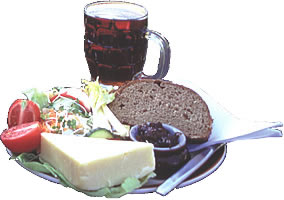 |
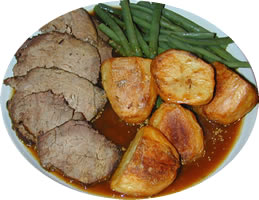 |
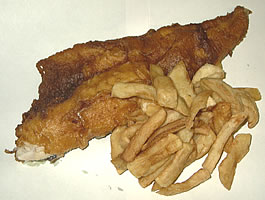 |
|
Ploughman's
lunch |
Roast beef, roast potatoes,
green beans and gravy |
Fish
and chips |
High tea is a light meal eaten in the early evening (for
example, 6 o'clock) served with a pot of tea; this is popular in north England
and Scotland. Supper is the most common name for the meal eaten in the
evening (usually between 7:00 and 8:30). Dinner is another common name
for supper, but sometimes it is also used to refer to lunch, especially when
this is the main meal of the day. A dinner party is a formal evening
meal to which guests have been invited. A common type of cooked meal in Britain
is meat and two veg. This is a meat dish served together on the same
plate with two types of vegetable, one of which is often a type of potato. It
is common to eat a dessert (also known as a pudding, or informally
as afters) after the main dish. You can see an example of a traditional
English restaurant menu from the website of Rules, the oldest restaurant in
London: http://www.rules.co.uk/rest/mfmenu.html.
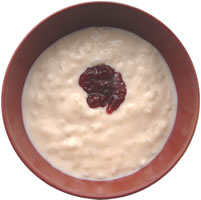 |
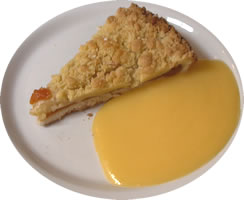 |
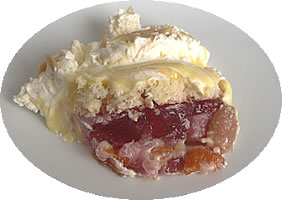 |
|
Rice pudding
|
Fruit crumble and custard
|
Trifle
|
British people enjoy eating snacks between meals. These
include sweets (American English: candy) and crisps (American
English: chips).
Back to top
|
|
|